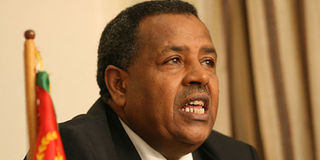Eritrea denies deportation of diplomat

Eritrean Ambassador to Kenya Salih Omar Abdu addresses journalists on Saturday. PHOTO/WILLIAM OERI
Eritrea on Saturday emphatically denied that one of its diplomats and another national had been deported from Kenya for security reasons.
Ambassador Salih Omar Abdu however confirmed the country’s Foreign Minister was in Kenya to deliver a special message to President Kibaki, just two days after US Secretary of State Hillary Clinton vowed to act on Eritrea for allegedly supporting Somalia insurgents.
In an interview with the Nation at the Eritrean embassy in Nairobi, Mr Abdu said: “None of the Eritrean embassy staff has been deported for the last two and half years that I have been in the country and before.”
The Nation had earlier reported that an Eritrean diplomat and a businessman had been expelled from Kenya. Immigration public communications officer, Mr E Njeru, said, “There are two cases involving Eritreans who were deported on security related grounds.” But Mr Abdu said the reports were “groundless and baseless.”
The envoy denied Mrs Clinton’s remarks that Eritrea was backing al-shabaab militias who are fighting the Somalia government and said Eritrea was not involved in efforts to destabilise the Ethiopian administration.
Although the Horn of Africa country with 5.5 million people sympathises with Somalis and wants their government reconstituted through comprehensive political reconciliation, the envoy said it had nothing to do with the al-shabaab.
Al-shabaab, which is believed to enjoy the backing of some foreigners, has killed hundreds of people and displaced thousands in its efforts to over-throw Sheikh Shariff Sheikh Ahmed government.
“Apart from Sheikh Ahmed who stayed in Eritrea for two years and hosting of conferences to try and bring peace to Somalia, Eritrea does not host the fighters,” the envoy said.
He added that Sheikh Ahmed’s rival, Sheikh Hassan Dahir Aweys also stayed in Eritrea. “Al-shabab has never stepped in Eritrea,” he said.
According to the envoy, the Oromo Liberation Front that is fighting the Ethiopian government is “struggling for self-determination.”
Mr Abdu accused Ethiopia of occupying Eritrea’s land, even after the latter fought for independence for 30 years and engaged in another war with it in 1998.
He said Eritrea severed links with Inter-Governmental Authority on Development (Igad) for “blessing” the invasion of Ethiopian forces to Somalia despite a UN security council resolution that countries bordering it should not engage there.
Saying President Sheikh Shariff was hand-picked, Mr Abdu told journalists that for peace to return to Somalia, the issues should be left to them and that other countries should only act as facilitators.
He described Eritrea’s relationship with Kenya as good and cordial and that his presence in Nairobi was to help enhance this adding that his country’s Foreign Minister, Mr Mohammed was in the country to deliver a message from Eritrea’s President Isaias Afeworki to President Kibaki but could not disclose the subject.
Mr Mohammed who is said to have tried to reach the President Kibaki but in vain was to leave the country on Friday.
On Friday, Foreign Affairs Minister Moses Wetangula confirmed receiving the letter which he promised to pass on to President when he returns from a trip to Zambia next week.
Mr Abdu said Eritrea, which gained independence in 1991, is against dependence syndrome and that it was exploring for oil which could be struck by next year. The country is also rich in gold.
On Thursday, Mrs Clinton who is on a tour of Africa, warned of unspecified action against Eritrea but on Saturday Mr Abdu said the country’s Foreign Minister visit to Kenya had nothing to do with it.
In Washington, State Department spokesman Robert Wood would not elaborate on Mrs Clinton’s warning, but said the Obama administration believed Eritrea was supplying arms to militant groups. The Somalia fighting in June alone left more than 250 civilians dead and forced 160,000 others to flee their homes.
On the US Government's warning, Mr Abdu said he hoped the superpower would abide by international law as Eritrea was “innocent” and that there was no evidence it was backing criminals.




